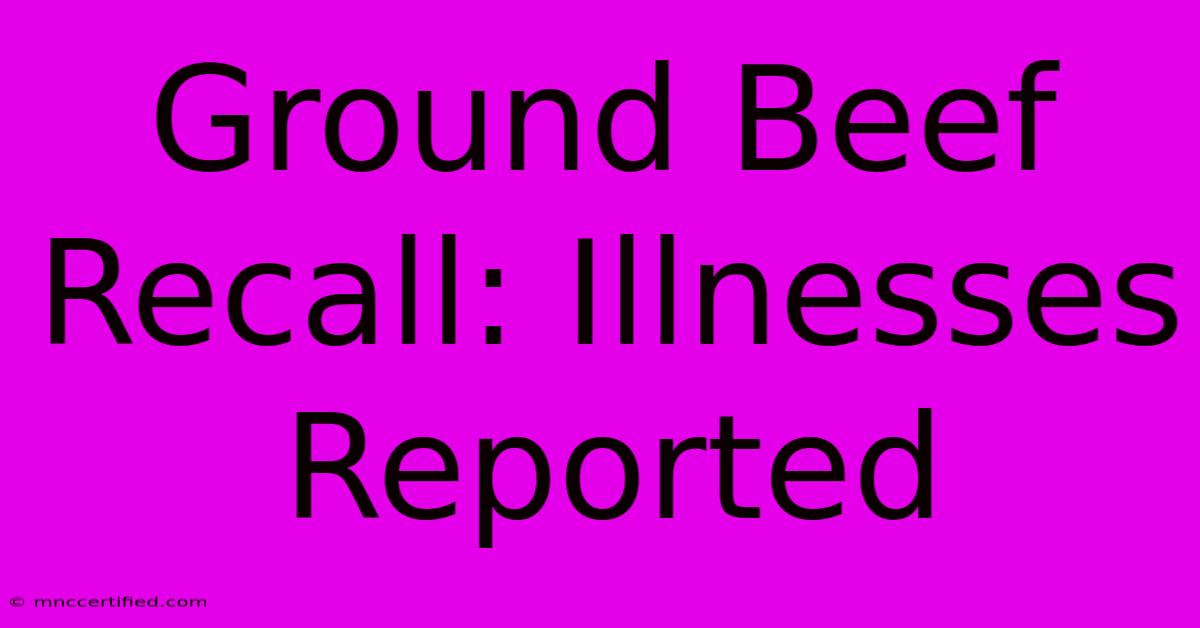Ground Beef Recall: Illnesses Reported

Table of Contents
Ground Beef Recall: Illnesses Reported – What You Need to Know
Recent reports of illnesses linked to contaminated ground beef have prompted a significant recall. This article provides crucial information about the recall, including affected products, potential health risks, and steps to take if you've purchased potentially contaminated beef. Understanding the details of this recall is crucial for protecting your family's health.
Understanding the Recall: Key Details
Several brands of ground beef have been recalled due to potential contamination with E. coli O157:H7, a dangerous bacteria that can cause severe food poisoning. The recall encompasses various package sizes and "best by" dates, so careful checking of your refrigerator is essential. The specific brands and product details are typically announced by the USDA's Food Safety and Inspection Service (FSIS) and will be widely reported by major news outlets. Always refer to official sources for the most up-to-date and accurate information.
Identifying Recalled Products
The recalled ground beef will usually be identified by a specific establishment number printed on the package. This number, often found within the USDA mark of inspection, is critical in determining whether your beef is part of the recall. The FSIS website often provides images of the recalled packages, making identification easier. Pay close attention to the product code, use-by date, and packaging details. Even seemingly minor differences can indicate whether your ground beef is affected.
Health Risks Associated with Contaminated Ground Beef
E. coli O157:H7 infections can cause serious illness, including:
- Diarrhea (often bloody): This is a common symptom and can be severe.
- Stomach cramps: Intense abdominal pain is frequently reported.
- Vomiting: This can lead to dehydration if severe.
- Fever: While not always present, a fever can indicate a more serious infection.
- Hemolytic uremic syndrome (HUS): In severe cases, E. coli O157:H7 can lead to HUS, a type of kidney failure. This is particularly dangerous for young children and the elderly.
If you experience any of these symptoms after consuming ground beef, seek immediate medical attention. Early diagnosis and treatment are vital in preventing serious complications.
What to Do if You Have Recalled Ground Beef
If you believe you have purchased recalled ground beef, do not consume it. Follow these steps:
- Check your refrigerator: Carefully examine all ground beef packages for the establishment number and other identifying information listed in the recall announcement.
- Discard the product: Do not attempt to cook or otherwise prepare the recalled ground beef. Dispose of it properly, ideally by double-bagging it and placing it in your outdoor trash.
- Clean thoroughly: Thoroughly clean any surfaces that came into contact with the recalled product, including countertops, cutting boards, and utensils, using hot, soapy water.
- Contact the company: You might be able to receive a refund or replacement.
- Monitor your health: Pay close attention to your body for any symptoms of E. coli infection.
Preventing Future Contamination
To minimize the risk of foodborne illnesses:
- Cook ground beef thoroughly: Use a food thermometer to ensure the internal temperature reaches 160°F (71°C).
- Wash hands frequently: Wash your hands thoroughly with soap and water before and after handling raw meat.
- Clean surfaces: Always clean and sanitize surfaces that have come into contact with raw meat.
- Store meat properly: Keep raw ground beef refrigerated at 40°F (4°C) or below.
- Separate raw meat from other foods: Avoid cross-contamination by keeping raw meat separate from ready-to-eat foods.
Staying informed about food recalls and practicing safe food handling techniques are essential for preventing foodborne illnesses. By following these guidelines, you can protect yourself and your family.
Keywords: Ground beef recall, E. coli, food poisoning, food safety, USDA, FSIS, foodborne illness, recall announcement, contaminated beef, health risks, food safety tips, safe food handling
Note: This article provides general information. Always refer to official sources like the USDA FSIS website for the most accurate and up-to-date details regarding specific ground beef recalls. This information is not a substitute for professional medical advice. If you suspect food poisoning, seek medical attention immediately.

Thank you for visiting our website wich cover about Ground Beef Recall: Illnesses Reported. We hope the information provided has been useful to you. Feel free to contact us if you have any questions or need further assistance. See you next time and dont miss to bookmark.
Featured Posts
-
Lakers Vs Magic Nov 21 3 Insights
Nov 22, 2024
-
Pokemon Trading Card Game Gb Rom
Nov 22, 2024
-
Skeleton Crew Red Carpet Interviews
Nov 22, 2024
-
Uk Storm Bert Snow Wind Rain Disruption
Nov 22, 2024
-
Live Us Embassy London Security Incident
Nov 22, 2024